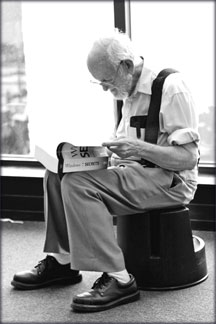Itís never too late to turn your life around
by Lional Wijesiri
Recently, I was reading an interesting memoir titled Never too late
by Anne Clark Martindell (1914 - 2008), an American politician and
diplomat. Martindell was a conventional mother and housewife until she
began a career at the age of 50.
|

There is no age limit for learning |
Landmarks in her late-blooming career included the completion of a
four-year degree program at Smith University College at 87, an event
that was the topic of a segment on many television programs including
The Oprah Winfrey Show, and a half-page article in The New York Times.
Martindell was born in New York City, the daughter of William J.
Clark, a lawyer and later, judge. In her memoir, she describes her early
life as sheltered, herself as shy, and her life as a New York debutante
as ďconventional.Ē Although she entered Smith College as a member of the
Class of 1936, she reported that her father was shocked to learn, after
her freshman year, that she planned a legal career and insisted that she
leave the College to marry, which she did at 19.
When she was 50 years old, she launched her career as an elementary
school teacher and fundraiser for charities. Appointed Vice-Chairperson
of the New Jersey Democratic Party in the 1960s, she drew media
attention when her all-male colleagues attempted to bar her presence at
a strategy meeting, but she forced her way in. At the age of 59,
Martindell was elected to the New Jersey State Senate where she served
until she was 63, focusing on legislation concerning education and the
environment.
She was among the first New Jersey politicians to endorse Jimmy
Carter for President and, after her term in the State Senate, she moved
to Washington where she served as Director of the Office of Foreign
Disaster Assistance. At the age of 65, she was nominated by President
Carter and confirmed by the US Senate as the US Ambassador to New
Zealand and Western Samoa. She served three years in that post.
Martindellís love of New Zealand lasted the rest of her life. When
she was 72 years, she was concerned about deteriorating US - New Zealand
relations, and founded the United States - New Zealand Council to
promote understanding and friendship. The Council, active to this day,
lists Martindell as Chairperson Emeritus.
If this sounds like a fable, and perhaps it qualifies, this would be
the place to point out several additional truths: Foremost, that all
first chances contain seeds for a second. Without water or soil, they
can lie dormant forever. Those seeds are durable, though. They can bloom
years later.
Second chance
  There are a few things we could learn from Martindell. We all need
second chances because this isnít a perfect world and we are not perfect
people. We rarely get things right the first time. Almost every major
accomplishment in a personís life starts with the decision to try again
and again - to get up after every failed attempt and give it another
shot. There are a few things we could learn from Martindell. We all need
second chances because this isnít a perfect world and we are not perfect
people. We rarely get things right the first time. Almost every major
accomplishment in a personís life starts with the decision to try again
and again - to get up after every failed attempt and give it another
shot.
The only difference between an opportunity and an obstacle is
attitude. Getting a second chance in life is about giving yourself the
opportunity to grow beyond your past failures.
Rules
Itís never too late to change direction. Regardless of past mistakes,
you can decide today to take a different path. Here are some suggestions
to help you:
The first step is to understand why you are where you are and what
went wrong. You canít turn your life around until you take
responsibility for your actions. If you blame other people or
circumstances, you inhibit your ability to make changes.
Next, identify exactly what actions you took, or decisions you made,
that led to your current situation. It may not be obvious at first, but
there is always a cause and effect. It may be hard to face what you have
done, but itís essential before you can turn things around.
Think ďWhat challenges do I have to overcome to turn things around?Ē
Some examples are further education, more time, extra money, getting rid
of bad habits, relationships and attitude. Having this understanding
allows you to begin to develop an action plan.
Identify negative self-talk. To turn your life around, you have to
believe you can and tell yourself you can. Many people have become so
used to negative self-talk that they accept it as normal. Telling
yourself that you canít do something, naturally prevents you from
accomplishing it.
Whatever mistakes you have made, you are not the first to make them.
There are many others before you who have travelled the same path. There
are also numerous examples of how these people managed to turn their
lives around. Look for these success stories and study the approach they
used. Thereís no need for you to reinvent the wheel. Itís a lot more
efficient to use the same plan that has been proven to work for others
than to figure everything out on your own.
Take a look at your present needs and expectations. We change over
time. We change as a result of our experiences. We donít want to make
decisions based on outdated needs and expectations. It simply means,
your goals have to fit you where you are today. Fulfilling a goal which
is externally imposed, rather than emanating from your own desires,
rarely leads to satisfaction, if it is attained at all. Part of this
process involves distinguishing needs from wants. People get into
trouble, especially financially, when they donít accurately separate the
two. Anything you can get by without, is a want. Be honest in this
assessment. Donít use what others have acquired as a gauge; you are not
in a competition.
These steps will help you turn your life around. While you canít undo
or change the past, you can take steps to get on to as positive a path
as possible. You are never too old, and itís never too late to start
turning your life around.
Opportunity
Every difficult moment in our lives is accompanied by an opportunity
for personal growth and creativity. However, to attain this growth and
creativity, we must first learn to let go of the past. We must recognise
that difficulties pass like everything else in life. And once they pass,
all weíre left with are our unique experiences and the lessons required
to make a better attempt next time. Donít quit just because you didnít
get it right on your first shot.
And donít waste your life fulfilling someone elseís dreams and
desires. You must follow your intuition and make a decision to never
give up on who you are capable of becoming.
Bottom line: If you want a real second chance, youíve got to be
willing to give it all you got. This means you have to strengthen and
maintain your self-control. Remember, life is not easy, especially when
you plan on achieving something worthwhile. Achieving your dreams can be
a lot of work, even the second time around. Be ready for it. |

